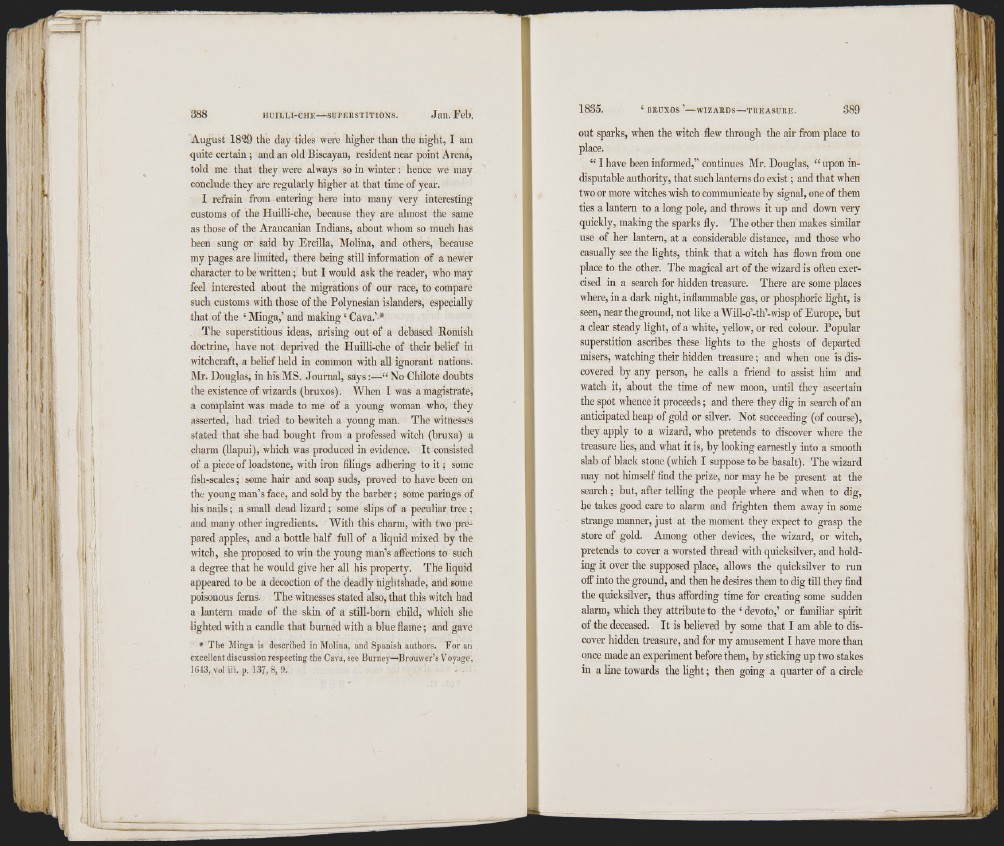
J
) i
n\
■j i
388 HUILLI-CHE SUPEHSTITIONS. Jan. Feb.
August 1829 the day tides were higher than the night, I am
quite certain; and an old Biscayan, resident near point Arena,
told me that they were always so in winter: hence we may
conclude they are regularly higher at that time of year.
I refrain from entering here into many very interesting
customs of the Huilli-che, because they are almost the same
as those of the Araucanian Indians, about whom so much has
been sung or said by Ercilla, Molina, and others, because
my pages are limited, there being still information of a newer
character to be written; but I would ask the reader, who may
feel interested about the migrations of our race, to compare
such customs with those of the Polynesian islanders, especially
that of the ‘ Minga,’ and making ‘ Cava.’ *
The superstitious ideas, arising out of a debased Romish
doctrine, have not deprived the Huilli-che of their belief in
witchcraft, a belief held in common with all ignorant nations.
Mr. Douglas, in his MS. Journal, says;—“ No Chilote doubts
the existence of wizards (bruxos). When I was a magistrate,
a complaint was made to me of a young woman who, they
asserted, had tried to bewitch a young man. The witnesses
stated that she had bought from a professed witch (hruxa) a
charm (llapui), which was produced in evidence. I t consisted
of a piece of loadstone, with iron filings adhering to i t ; some
fish-scales; some hair and soap suds, proved to have been on
the young man’s face, and sold by the barber; some parings of
his nails; a small dead lizard; some slips of a peculiar tree ;
and many other ingredients. With this charm, with two prepared
apples, and a bottle half full of a liquid mixed by the
witch, she proposed to win the young man’s affections to such
a degree that he would give her all his property. The liquid
appeared to be a decoction of the deadly nightshade, and some
poisonous ferns. The witnesses stated also, that this witch had
a lantern made of the skin of a still-born child, which she
lighted with a candle that burned with a blue flame; and gave
* The Minga is descrited in Molina, and Spanish authors. For an
excellent discussion respecting the Cava, see Burney—Brouwer’s Voyage,
1643, vol iii. p. 137, 8, 9.
1835. BRUXOS WIZARDS TREASURE. 389
out sparks, when the witch flew through the air from place to
place.
“ I have been informed,” continues Mr. Douglas, “ upon indisputable
authority, that such lanterns do exist; and that when
two or more witches wish to communicate by signal, one of them
ties a lantern to a long pole, and throws it up and down very
quickly, making the sparks fly. The other then makes similar
use of her lantern, at a considerable distance, and those who
casually see the lights, think that a witch has flown from one
place to the other. The magical art of the wizard is often exercised
in a search for hidden treasure. There are some places
where, in a dark night, inflammable gas, or phosphoric light, is
seen, near theground, not like aAVill-o’-th’-wisp of Europe, but
a clear steady light, of a white, yellow, or red colour. Popular
superstition ascribes these lights to the ghosts of departed
misers, watching their hidden treasure; and when one is discovered
by any person, he calls a friend to assist him and
watch it, about the time of new moon, until they ascertain
the spot whence it proceeds; and there they dig in search of an
anticipated heap of gold or silver. Not succeeding (of course),
they apply to a wizard, who pretends to discover where the
treasure lies, and what it is, by looking earnestly into a smooth
slab of black stone (which I suppose to be basalt). The wizard
may not himself find the prize, nor may he be present at the
search; but, after telling the people where and when to dig,
he takes good care to alai-m and frighten them away in some
strange manner, just at the moment they expect to grasp the
store of gold. Among other devices, the wizard, or witch,
pretends to cover a worsted thread with quicksilver, and holding
it over the supposed place, allows the quicksilver to run
off into the ground, and then he desires them to dig till they find
the quicksilver, thus affording time for creating some sudden
alarm, which they attribute to the ‘ devoto,’ or familiar spirit
of the deceased. It is believed by some that I am able to discover
hidden treasure, and for my amusement I have more than
once made an experiment before them, by sticking up two stakes
in a line towards the light; then going a quarter of a circle
1
i;
u
■1
Ji!